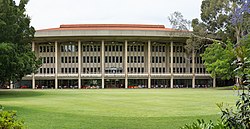| Year | Architect | Project | Location | Year built | Years since | Other AIA Awards |
|---|
| 2025 | Forbes and Fitzhardinge | CRA Advanced Technology Building
(now Brodie-Hall Building)
Building 610 [5] | Turner Avenue, Curtin University, Bentley | 1989 | 36 years | - Triennial Architecture Medal, 1993 (WA Chapter) [6]
- Architecture Medal 1994, (WA Chapter)
- Architecture Award, 1990
|
| 2024 | Summerhayes and Associates | CBH Building [7] [8] | 22 Delhi Street, West Perth | 1968 | 55 years | |
| 2023 | Julius Elischer | Wollaston College Chapel [9] [10] [11] | 5 Wollaston Road, Mt Claremont | 1965 | 58 years | |
| 2022 | Hobbs Winning Leighton Partners (John Lidbury) and With Architecture Studio | Christ Church Grammar School Chapel [12] | Queenslea Drive, Claremont | 1970 | 52 years | |
| 2021 | Iwan Iwanoff | Town of Northam Council Offices and Library (now Shire of Northam) [13] | 298 Fitzgerald Street, Northam | 1973 | 48 years | |
| 2020 | Rodney Alsop and Conrad Sayce | Hackett Memorial Buildings [14] | University of Western Australia, Mounts Bay Road, Crawley | 1932 | 88 years | |
| 2019 | Harry Seidler | QV1 [16] | 250 St Georges Terrace, Perth | 1991 | 37 years | - Architecture Design Award, Commercial buildings over $200m, 1992 (WA)
- Commendation, Civic Design Award for Commercial Buildings, 1992 (WA)
- Best design for a commercial building over $200m, 1992 (National)
|
| 2018 | Cameron Chisholm Nicol | Allendale Square (office tower) [17] | 77 St Georges Terrace, Perth | 1976 | 42 years | - Design Award, 1978
- Bronze Medal, 1981 (WA Chapter)
|
| 2017 | Cameron Chisholm Nicol | Reid Library [18] | University of Western Australia, Crawley | 1964 | 51 years | |
| 2016 | Howlett and Bailey Architects | Perth Concert Hall [19] | 5 St Georges Terrace, Perth | 1973 | 43 years | |
| 2015 | Howlett and Bailey Architects | Council House [20] | 27–29 St Georges Terrace, Perth | 1963 | 52 years | |
|






